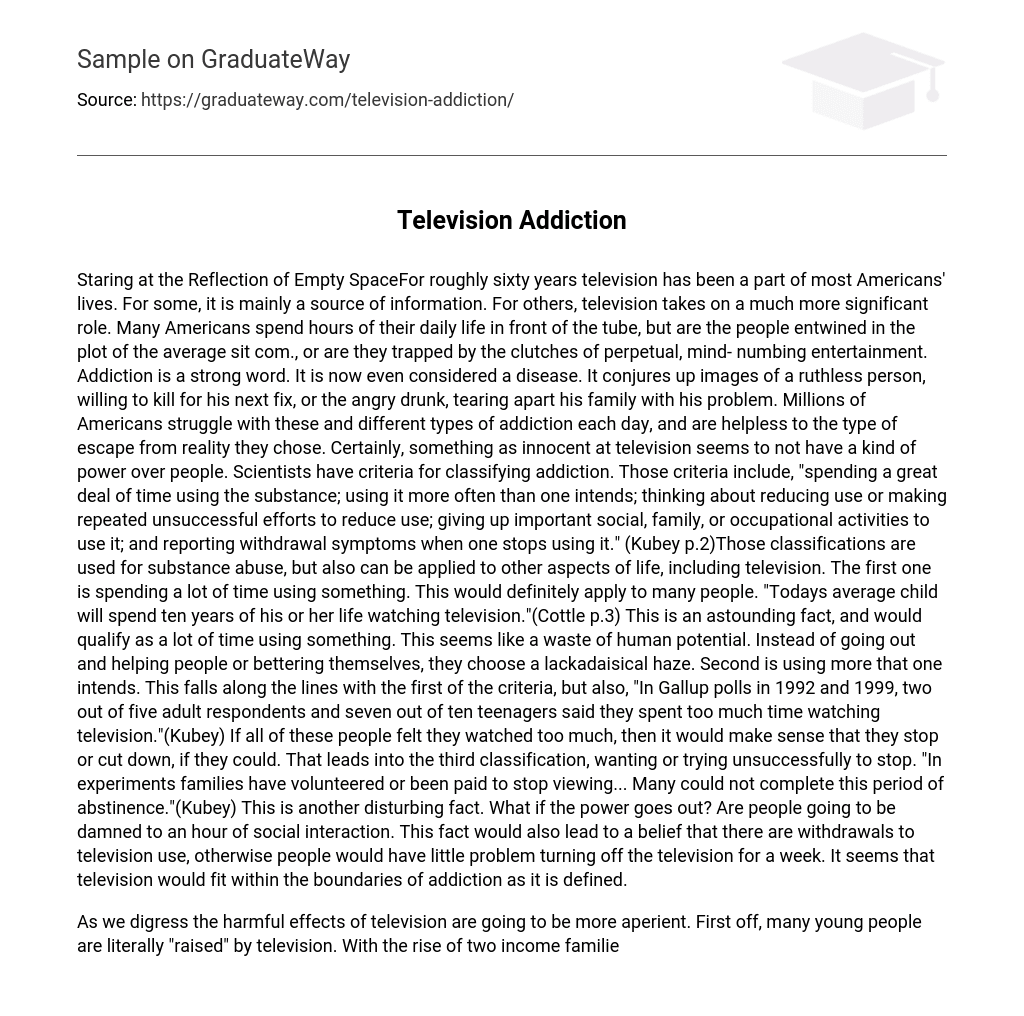Staring at the Reflection of Empty SpaceFor roughly sixty years television has been a part of most Americans’ lives. For some, it is mainly a source of information. For others, television takes on a much more significant role. Many Americans spend hours of their daily life in front of the tube, but are the people entwined in the plot of the average sit com., or are they trapped by the clutches of perpetual, mind- numbing entertainment. Addiction is a strong word. It is now even considered a disease.
It conjures up images of a ruthless person, willing to kill for his next fix, or the angry drunk, tearing apart his family with his problem. Millions of Americans struggle with these and different types of addiction each day, and are helpless to the type of escape from reality they chose. Certainly, something as innocent at television seems to not have a kind of power over people. Scientists have criteria for classifying addiction.
Those criteria include, “spending a great deal of time using the substance; using it more often than one intends; thinking about reducing use or making repeated unsuccessful efforts to reduce use; giving up important social, family, or occupational activities to use it; and reporting withdrawal symptoms when one stops using it.” (Kubey p.2)Those classifications are used for substance abuse, but also can be applied to other aspects of life, including television. The first one is spending a lot of time using something.
This would definitely apply to many people. “Todays average child will spend ten years of his or her life watching television.”(Cottle p.3) This is an astounding fact, and would qualify as a lot of time using something. This seems like a waste of human potential. Instead of going out and helping people or bettering themselves, they choose a lackadaisical haze. Second is using more that one intends. This falls along the lines with the first of the criteria, but also, “In Gallup polls in 1992 and 1999, two out of five adult respondents and seven out of ten teenagers said they spent too much time watching television.”(Kubey) If all of these people felt they watched too much, then it would make sense that they stop or cut down, if they could.
That leads into the third classification, wanting or trying unsuccessfully to stop. “In experiments families have volunteered or been paid to stop viewing… Many could not complete this period of abstinence.”(Kubey) This is another disturbing fact. What if the power goes out? Are people going to be damned to an hour of social interaction. This fact would also lead to a belief that there are withdrawals to television use, otherwise people would have little problem turning off the television for a week. It seems that television would fit within the boundaries of addiction as it is defined.
As we digress the harmful effects of television are going to be more aperient. First off, many young people are literally “raised” by television. With the rise of two income families, and single parent families there is less time for parents to acknowledge the day to day problems of their children. This leaves them open to manipulation from the ideas of television. Whether about sex, drugs, or what style of clothes to wear. What is worse is the strength of advertising in the media. With improved techniques for attention grabbing, such as several scenes cut together quickly to pull in viewers subconsciously, they are more effectively captivating audiences.
Also, with the amount of time watching television there is a lot time watching commercials. This adds up to hundreds of mixed messages on what you need to buy or do to be happy, leaving the viewer so confused that they are ready to do what television says. Next is the aspect of always being entertained. When you are looking for something like that, it may seem good at first, but what about when you can’t watch television. “Heavy viewers report feeling significantly more anxious and less happy than light viewers do in unstructured situations, such as doing nothing, daydreaming, or waiting in line.”(Kubey) Another part of television is the type of characters found on most programs. The viewer is left with a parade of stereotypes.
From the flamboyant gay guy, to the stuck up upperclass white guy, to the vulnerable attractive female role. All of these leave a viewer confused when it come time to interact with real people who actually have depth. Which comes to the next problem of social infraction. For a child who spends so much time glaring into the emptiness, there is less time for friends and development of social skills important in interaction later in life. If you add the Internet to the equation then there is a recipe for never leaving ones house.
The final harmful effect of too much television is what the viewer expects out of life. In television, the main values portrayed are money and love. The person without money stumbles upon a way to get money, and the lonely person finds love. Or in sit come, the world is turned upside down, but the people manage to solve all of their problems and everything is back to “normal” with in a half hour. This is not even close to how life really is, yet it is the impression blared acrossed the airwaves twenty-four hours a day. This leaves people unprepared to deal with a real problem and more willing to delve back into the world of fantasy, where things make sense to them.
Taken as a whole television has its good and bad points. For those who look to television for world events or educational programs, it is an excellent source. For those who look to television to keep them constantly entertained, there is a world of problems in store, including addiction and the blurring of the lines of reality, and the answer is not on prime time.





